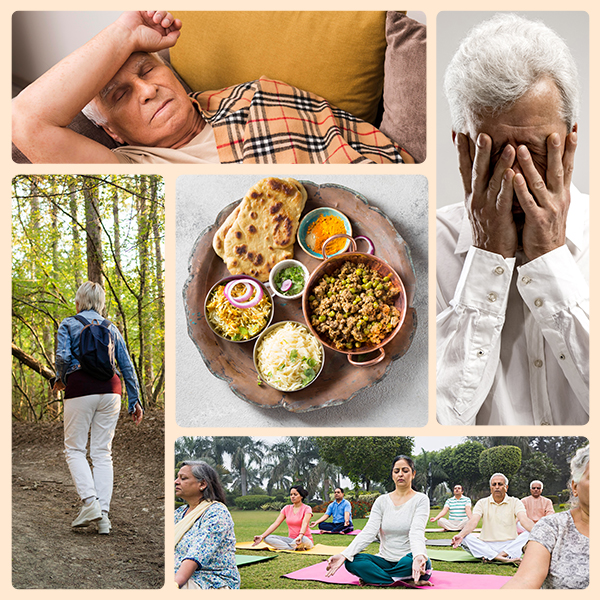Decoding Biological Age vs Chronological Age
Blogs24 Jun 2025
IN THIS ARTICLE
The most important and unavoidable biological process is that of ageing. You can fix your stomach, and you can get help for your mind, but it’s impossible to avoid the inevitable passage of time and the cycle of ageing. And age as a whole, is more than just a number. It determines and defines the series of biological changes that occur in our bodies over time. However, the process of ageing varies significantly from person to person, primarily due to the differences in their biological and chronological ages.
In this article, we’ll decode age by understanding chronological ageing and biological ageing. We’ll also go to which is more important and give you some helpful tips to address this process with knowledge and patience.
Types of Ageing
Ageing can be classified into two types:
- Chronological age
- Biological age
What is Chronological Age?
Chronological age is the regular way you count your age. This age is the one you put on your government ID, legal documents etc. It’s the formally accepted way of counting age and begins on the day you are born. Chronological age cannot be changed, its number will always be counted from the day you were born to the current day.
What is the Biological Age?
While we know that you can’t change your age, there are people who seem to be younger than they are. This could be in their appearance or their fitness levels. That’s along the lines of how we define biological age.
Biological age is an estimate of a person's overall health and physiological status. It may be higher or lower than your chronological age depending on your lifestyle, genetics, environmental factors and habits. You can use a biological age calculator to help understand your health and gauge your lifespan.
Factors that determine biological ageing

- Diet
- Exercise
- Stress
- Sleeping habits
- Physical environments
Biological Age vs. Chronological Age
Here’s a simple table to help you understand these two concepts and their difference clearly:
Chronological Ageing | Biological Ageing |
It is the sum of all the days a person has been alive since the day they were born | Indicates overall health and physiological status |
Calculated from the date of birth to the present day | Impacted by lifestyle, genetics, and environment |
Cannot be influenced by any factors | This can be reduced by leading a healthy lifestyle |
Factors That Can Affect Biological Ageing
Eating well
Having a nourishing and nutritional diet can do wonders for your health and decrease your biological age. A balanced and healthy diet can prevent chronic health conditions, keep your health systems stable and functional and give you ample energy to take on life as you age. Look to add food that is lower in calories, and higher in micronutrients , protein and fibre. Some examples of foods you can include are whole grains and cereals like whole wheat, Jowar, Kangni, oats, vegetables like spinach, tomatoes, fruits like cranberries and papaya, along with almonds, raisins, pumpkin seeds, flax seeds etc.
Exercise is essential
Movement is key when it comes to prioritising your health and keeping your muscles, bones, heart and more healthy. Regular exercise can also have a positive impact on your biological age and keep you feeling younger than you actually are.
Stress less
Did you know that the stress you feel can actually impact your biological age? Stress negatively affects biological age by increasing it, and this has been established by many studies. However, if managed and resolved, it may reduce your biological age. So, it’s important to keep your mind healthy and calm, through a series of mindful practices to relieve stress!
Improve Sleep Quality
Consistently sleeping well leads to better mental and physical health. In fact, having sleep disturbances or issues often causes several health issues and can also be a factor in increasing your biological age.
Physical environments
Your physical environment can be a cause of your rapid biological ageing. Science has found that environmental exposures to metals, air pollution, chemicals, noise etc., may accelerate biological ageing. It can be nearly impossible to cut down exposure to all of these things, but you can prioritise being in calm and safe environments and improve your sleep quality to reduce the damage.
Conclusion
Understanding the distinction between chronological and biological age can help us learn more about ageing and how to handle it well. While we can't control our chronological ageing, we can positively influence our biological age through lifestyle modifications. Embracing healthy ageing habits can help us slow the process of biological ageing, promoting a healthier, and happier life.
Ageing is a natural journey that can be navigated well with the right information and support. We at Right Shift aim to do just that. You can explore our various informational blogs on health-related topics, use our in-house health score calculator to understand your current health levels better and our free meal plans that are curated by nutritionists and can be personalised to get started on your goals!
Other Popular Blogs
What is Healthy Ageing | Healthy Habits for Ageing | Healthy Lifestyle Tips & Habits for Midlife | Understanding the Ageing Process |
FAQs
Chronological age refers to the number of years a person has been alive, while biological age refers to how old a person seems based on various factors like physical health and performance capability.
Not necessarily. While chronological age is a clear indicator of years lived, biological age provides a more comprehensive view of an individual's overall health and wellness.
1. Leisure-time physical activity and DNA methylation age—a twin study, Clinical Epigenetics
2. Stress-induced increases in biological age are reversible, NIH
3. Sleep and Biological Aging, PMC




